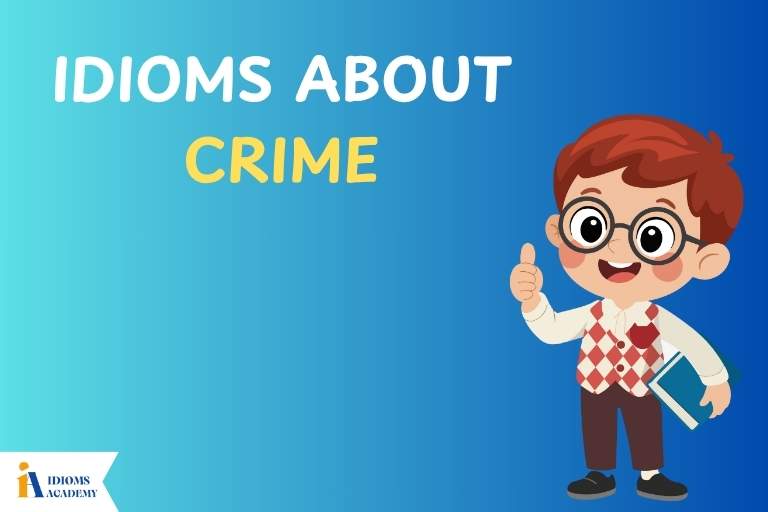People all over the world like peace. Peace means calm, quiet, and no fighting. It can happen in a classroom, at home, or even between countries. When there is peace, people can feel safe and happy. We use special phrases, called idioms, to talk about peace. These idioms help us explain feelings and situations in a fun way.
Idioms about peace are used in everyday life. They can talk about feeling calm, solving problems, or living quietly. You might hear them in books, movies, or in conversations. They are like short sayings with hidden meanings. Learning them can help you understand others better and make your own speaking more colorful. In this article, we will explore many idioms that describe peace and what they mean.
Idioms About Peace
1. Make peace
Meaning: To stop fighting and become friends again.
Example Sentences:
- After their argument, the two friends decided to make peace.
- The neighbors made peace after the misunderstanding.
Other ways to say: Settle differences, reconcile
Fun Fact/Origin: This phrase has been used for centuries to describe the act of resolving conflicts and restoring harmony.
Usage: Used when people stop arguing and become friendly again.
2. Peace of mind
Meaning: A feeling of being safe and not worried.
Example Sentences:
- Knowing her family was safe gave her peace of mind.
- He locked the doors for peace of mind before going to bed.
Other ways to say: Feeling secure, mental calmness
Fun Fact/Origin: This phrase emphasizes the importance of inner tranquility and has been commonly used in literature and daily conversation.
Usage: Used when someone feels calm and free from worry.
3. Bury the hatchet
Meaning: To end a fight and become friends again.
Example Sentences:
- After years of rivalry, the two teams decided to bury the hatchet.
- The siblings buried the hatchet and played together again.
Other ways to say: Reconcile, make up
Fun Fact/Origin: This idiom comes from a Native American tradition where warriors would bury their weapons to signify peace.
Usage: Used when people decide to stop fighting and be friendly.
4. Hold one’s peace
Meaning: To stay silent and not speak.
Example Sentences:
- She held her peace during the meeting, even though she disagreed.
- He decided to hold his peace to avoid an argument.
Other ways to say: Stay quiet, keep silent
Fun Fact/Origin: This phrase has roots in old English legal and religious ceremonies, where individuals were asked to remain silent if they had objections.
Usage: Used when someone chooses not to speak, especially to avoid conflict.
5. Keep the peace
Meaning: To maintain a calm and non-violent situation.
Example Sentences:
- The teacher worked hard to keep the peace in the classroom.
- Parents often try to keep the peace during family gatherings.
Other ways to say: Maintain harmony, prevent conflict
Fun Fact/Origin: This phrase is commonly used in law enforcement and community contexts to describe efforts to prevent disturbances.
Usage: Used when someone ensures that a situation remains calm and orderly.
6. Peace and quiet
Meaning: A calm and silent environment.
Example Sentences:
- She went to the library for some peace and quiet.
- After a noisy day, he enjoyed the peace and quiet of his room.
Other ways to say: Tranquility, calmness
Fun Fact/Origin: This phrase emphasizes the desire for a serene environment, free from noise and stress.
Usage: Used when someone seeks or enjoys a calm and quiet setting.
7. Rest in peace
Meaning: A phrase used to express the hope that someone who has died finds peace.
Example Sentences:
- We said goodbye to our grandfather, hoping he would rest in peace.
- The tombstone read, “Rest in peace.”
Other ways to say: Eternal rest, peaceful afterlife
Fun Fact/Origin: This phrase has been used since the 8th century in Christian prayers and epitaphs.
Usage: Used to express condolences and respect for someone who has passed away.
8. At peace
Meaning: Feeling calm and content.
Example Sentences:
- After resolving the issue, she felt at peace.
- He was at peace with his decision.
Other ways to say: Content, serene
Fun Fact/Origin: This phrase is often used to describe a state of inner tranquility and acceptance.
Usage: Used when someone feels calm and untroubled.
9. Olive branch
Meaning: A symbol or offer of peace.
Example Sentences:
- She extended an olive branch by apologizing first.
- The countries exchanged olive branches to end the conflict.
Other ways to say: Peace offering, reconciliation
Fun Fact/Origin: In ancient Greece, the olive branch was a symbol of peace and victory.
Usage: Used when someone offers to make peace.
10. Peace out
Meaning: A casual way to say goodbye.
Example Sentences:
- “I’m heading home now. Peace out!”
- He waved and said, “Peace out, everyone!”
Other ways to say: Goodbye, see you later
Fun Fact/Origin: This phrase became popular in the 1990s as a slang term for farewell.
Usage: Used informally to say goodbye.
11. Make amends
Meaning: To fix something after doing wrong.
Example Sentences:
- He made amends by saying sorry to his friend.
- She brought cookies to make amends for being late.
Other ways to say: Apologize, fix things
Fun Fact/Origin: The word “amends” comes from the French word “amender,” meaning to correct.
Usage: Used when someone tries to repair a relationship.
12. Break bread
Meaning: To share a meal peacefully.
Example Sentences:
- The neighbors broke bread together during the picnic.
- They broke bread after their long argument.
Other ways to say: Share a meal, eat together
Fun Fact/Origin: Comes from ancient times when eating together showed friendship.
Usage: Used when people eat together peacefully.
13. Smooth things over
Meaning: To fix a problem or argument.
Example Sentences:
- Mom helped smooth things over between the siblings.
- The teacher smoothed things over after the fight.
Other ways to say: Settle things, calm things down
Fun Fact/Origin: Comes from the idea of making a rough surface smooth.
Usage: Used when someone helps end an argument.
14. Cool down
Meaning: To calm down after being angry.
Example Sentences:
- He needed time to cool down after the game.
- She took a walk to cool down.
Other ways to say: Calm down, relax
Fun Fact/Origin: Comes from how things lose heat and become cooler.
Usage: Used when someone needs to relax after being upset.
15. Mend fences
Meaning: To fix a broken relationship.
Example Sentences:
- The two friends mended fences after the disagreement.
- He called his cousin to mend fences.
Other ways to say: Repair friendship, make up
Fun Fact/Origin: From farming, where fixing fences helps keep peace between neighbors.
Usage: Used when people make up after a fight.
16. Come to terms
Meaning: To accept or agree on something.
Example Sentences:
- They came to terms and stopped arguing.
- She came to terms with the change in plans.
Other ways to say: Accept, agree
Fun Fact/Origin: This phrase was first used in legal and business agreements.
Usage: Used when people agree or accept something.
17. Let sleeping dogs lie
Meaning: Don’t restart old problems.
Example Sentences:
- I didn’t bring it up again—I let sleeping dogs lie.
- He let sleeping dogs lie and stayed quiet.
Other ways to say: Leave it alone, don’t stir things up
Fun Fact/Origin: From the idea that waking a dog could cause trouble.
Usage: Used when avoiding old fights or problems.
18. Live and let live
Meaning: Accept differences and don’t fight.
Example Sentences:
- He believed in live and let live, even if others were different.
- We live and let live at our school.
Other ways to say: Be tolerant, let things be
Fun Fact/Origin: Used to promote peace by accepting others.
Usage: Used when someone accepts others’ choices.
19. Call a truce
Meaning: To stop fighting for a while.
Example Sentences:
- The kids called a truce during recess.
- We called a truce to enjoy the party.
Other ways to say: Pause the fight, take a break
Fun Fact/Origin: From war times when sides stopped fighting for peace talks.
Usage: Used when people stop arguing for a bit.
20. Calm before the storm
Meaning: A quiet time before something big or stressful.
Example Sentences:
- The house was quiet, the calm before the storm of guests.
- It was the calm before the storm before the test started.
Other ways to say: Peace before chaos, quiet time
Fun Fact/Origin: Comes from weather patterns where calm air comes before a storm.
Usage: Used when a quiet moment is followed by stress.
21. Keep calm
Meaning: To stay relaxed and not panic.
Example Sentences:
- She tried to keep calm during the fire drill.
- He told his sister to keep calm before the recital.
Other ways to say: Stay cool, don’t worry
Fun Fact/Origin: Made popular during World War II in British posters saying, “Keep Calm and Carry On.”
Usage: Used when someone needs to stay relaxed.
22. Quiet as a mouse
Meaning: Very silent or not making noise.
Example Sentences:
- The baby was quiet as a mouse during nap time.
- They were quiet as mice during hide-and-seek.
Other ways to say: Very quiet, silent
Fun Fact/Origin: Mice are known for being quiet and sneaky.
Usage: Used when someone makes little to no sound.
23. Put your mind at ease
Meaning: To help someone feel calm.
Example Sentences:
- The teacher put our minds at ease before the test.
- Mom put my mind at ease with a hug.
Other ways to say: Comfort, reassure
Fun Fact/Origin: This means removing worry from the mind.
Usage: Used when helping someone feel better.
24. Still waters run deep
Meaning: Quiet people often think a lot or feel deeply.
Example Sentences:
- He doesn’t say much, but still waters run deep.
- She’s quiet, but still waters run deep.
Other ways to say: Quiet but thoughtful, deep thinker
Fun Fact/Origin: Refers to calm rivers that are deep and strong under the surface.
Usage: Used to describe calm people with strong feelings or thoughts.
25. Keep a low profile
Meaning: To avoid attention and stay quiet.
Example Sentences:
- He kept a low profile at the party.
- They kept a low profile to avoid trouble.
Other ways to say: Stay unnoticed, be quiet
Fun Fact/Origin: From spy or military language, meaning to stay hidden.
Usage: Used when someone tries not to stand out.
26. Go with the flow
Meaning: To accept things as they happen.
Example Sentences:
- She went with the flow during the school trip.
- He decided to go with the flow and not complain.
Other ways to say: Adapt, follow along
Fun Fact/Origin: Comes from the idea of water moving smoothly.
Usage: Used when someone is flexible and relaxed.
27. Peace reigns
Meaning: Peace is in control or everything is calm.
Example Sentences:
- After the argument, peace reigned in the classroom.
- Peace reigned once the noisy guests left.
Other ways to say: All is calm, everything is quiet
Fun Fact/Origin: The word “reign” is used like a king or queen ruling over peace.
Usage: Used to describe a calm situation.
28. Leave in peace
Meaning: To let someone be without bothering them.
Example Sentences:
- He asked to be left in peace while reading.
- The cat just wants to nap in peace.
Other ways to say: Don’t disturb, let be
Fun Fact/Origin: Often used when someone needs quiet or space.
Usage: Used when someone wants to be alone or not interrupted.
29. Tranquil as a pond
Meaning: Very calm and peaceful.
Example Sentences:
- The backyard was tranquil as a pond.
- Her mood was tranquil as a pond after the walk.
Other ways to say: Very calm, peaceful
Fun Fact/Origin: Ponds are often still and quiet, making them a symbol of calm.
Usage: Used to describe a calm place or person.
30. Like a breath of fresh air
Meaning: Something that brings peace or a good change.
Example Sentences:
- Her smile was like a breath of fresh air.
- The new rule was like a breath of fresh air at school.
Other ways to say: A nice change, something refreshing
Fun Fact/Origin: Fresh air helps people feel better, especially after stress.
Usage: Used when something brings calm or good feelings.
31. Not a care in the world
Meaning: Feeling peaceful and stress-free.
Example Sentences:
- On summer break, she had not a care in the world.
- The puppy played with not a care in the world.
Other ways to say: Carefree, happy
Fun Fact/Origin: Used to show total peace, like nothing is wrong.
Usage: Used when someone feels free from worries.
32. Let it be
Meaning: To leave things alone and not interfere.
Example Sentences:
- When he saw the mess, he decided to let it be.
- She told her friend to let it be and move on.
Other ways to say: Leave it alone, don’t get involved
Fun Fact/Origin: Popularized by The Beatles’ song “Let It Be.”
Usage: Used when someone chooses peace over action.
33. Like watching a sunset
Meaning: Something peaceful and relaxing.
Example Sentences:
- Reading her book was like watching a sunset.
- His voice was as calm as watching a sunset.
Other ways to say: Very peaceful, calming
Fun Fact/Origin: Sunsets are often quiet, slow, and beautiful—perfect symbols of peace.
Usage: Used to describe calming experiences.
34. Soothe the soul
Meaning: To make someone feel peaceful inside.
Example Sentences:
- Music can soothe the soul after a long day.
- Her kind words soothed his soul.
Other ways to say: Comfort, bring peace
Fun Fact/Origin: “Soul” refers to a person’s inner feelings.
Usage: Used when something deeply calms a person.
35. Walk on eggshells (to keep peace)
Meaning: To act carefully to avoid conflict.
Example Sentences:
- He walked on eggshells so he wouldn’t upset her.
- They walked on eggshells during the family dinner.
Other ways to say: Be careful, avoid trouble
Fun Fact/Origin: Stepping on eggshells would break them—just like tense situations.
Usage: Used when trying to keep peace by being very careful.
36. Peaceful as a dove
Meaning: Very calm and gentle.
Example Sentences:
- She looked peaceful as a dove while sleeping.
- The room was peaceful as a dove after the baby stopped crying.
Other ways to say: Calm, soft
Fun Fact/Origin: Doves are symbols of peace in many cultures.
Usage: Used to describe quiet or gentle behavior.
37. Take it easy
Meaning: To relax and not worry.
Example Sentences:
- Dad told me to take it easy after school.
- She takes it easy on weekends.
Other ways to say: Relax, don’t stress
Fun Fact/Origin: This saying became common in American slang in the 20th century.
Usage: Used to remind someone to rest or calm down.
38. As quiet as a whisper
Meaning: Very soft and peaceful.
Example Sentences:
- The room was as quiet as a whisper.
- His voice was as quiet as a whisper during the test.
Other ways to say: Very quiet, hushed
Fun Fact/Origin: Whispers are low and soft—often used when trying not to disturb peace.
Usage: Used when something is extremely quiet.
39. Stay out of it (to keep the peace)
Meaning: To avoid getting involved in arguments.
Example Sentences:
- He stayed out of it to keep the peace.
- I stayed out of the fight between my friends.
Other ways to say: Don’t interfere, mind your own business
Fun Fact/Origin: Often used when trying not to make a conflict worse.
Usage: Used to describe peaceful choices during conflicts.
40. Mind your own business
Meaning: To focus on your own things, avoiding conflict.
Example Sentences:
- She minded her own business at lunch.
- He told his brother to mind his own business.
Other ways to say: Don’t interfere, stay out
Fun Fact/Origin: This phrase encourages peace by avoiding drama.
Usage: Used when choosing to avoid problems.
41. Peace of heart
Meaning: Feeling calm and happy inside.
Example Sentences:
- Volunteering gave her peace of heart.
- He found peace of heart by helping others.
Other ways to say: Inner calm, contentment
Fun Fact/Origin: Related to “peace of mind,” but focused on feelings, not thoughts.
Usage: Used when someone feels peaceful emotionally.
42. Keep your cool
Meaning: To stay calm under pressure.
Example Sentences:
- He kept his cool during the spelling bee.
- She kept her cool when the dog barked.
Other ways to say: Stay calm, don’t lose control
Fun Fact/Origin: Comes from the idea of not “heating up” with anger.
Usage: Used during tense or exciting moments.
43. Soft-spoken
Meaning: Someone who speaks gently and calmly.
Example Sentences:
- The soft-spoken teacher made everyone feel calm.
- He’s soft-spoken and kind.
Other ways to say: Gentle speaker, quiet voice
Fun Fact/Origin: “Soft” voices usually bring a peaceful mood.
Usage: Used to describe peaceful talkers.
44. Harmony in the air
Meaning: A peaceful, happy feeling in a place.
Example Sentences:
- There was harmony in the air during the holiday.
- Harmony was in the air at the family picnic.
Other ways to say: Good vibes, peaceful feeling
Fun Fact/Origin: Harmony means things go well together—like in music.
Usage: Used when peace and joy are felt in a group.
45. Like a calm lake
Meaning: Peaceful and still, without stress.
Example Sentences:
- Her thoughts were like a calm lake.
- The classroom was like a calm lake after storytime.
Other ways to say: Peaceful, steady
Fun Fact/Origin: Lakes are often still, so they represent calmness.
Usage: Used to describe a very calm feeling or place.
Quiz: Idioms About Peace
Instructions: Read each question and the answer choices carefully. Pick the letter that best matches the meaning of the phrase or expression.
Question Key
1. What does “bury the hatchet” mean?
A) Hide something in the ground
B) End a fight and become friends
C) Plant a tree together
2. If someone says “keep the peace,” what are they trying to do?
A) Stay silent forever
B) Avoid conflict and stay calm
C) Win an argument
3. When someone wants “peace and quiet,” what do they want?
A) A party with music
B) A fun, loud event
C) A calm and quiet space
4. What does it mean to “hold your peace”?
A) Sing a song
B) Say something loudly
C) Stay silent and not speak
5. What does “make peace” mean?
A) Build something
B) Stop fighting and become friends
C) Make a puzzle
6. If someone “lets sleeping dogs lie,” what are they doing?
A) Waking up pets
B) Avoiding old problems
C) Feeding animals
7. When someone is “quiet as a mouse,” what does it mean?
A) They’re playing with animals
B) They’re very noisy
C) They’re being very quiet
8. What does “go with the flow” mean?
A) Swim in a pool
B) Accept things as they come
C) Stop moving
9. If you “call a truce,” what are you doing?
A) Starting a game
B) Beginning a fight
C) Stopping an argument
10. What does “like a breath of fresh air” mean?
A) Something new and calming
B) Opening a window
C) Breathing deeply
11. What does “take it easy” mean?
A) Move quickly
B) Relax and don’t worry
C) Study hard
12. When someone is “peaceful as a dove,” how do they act?
A) Wild and noisy
B) Strong and fast
C) Calm and gentle
13. What does “stay out of it” mean when used to keep the peace?
A) Don’t get involved
B) Leave the house
C) Jump into the argument
Answer Key
- B) End a fight and become friends
- B) Avoid conflict and stay calm
- C) A calm and quiet space
- C) Stay silent and not speak
- B) Stop fighting and become friends
- B) Avoiding old problems
- C) They’re being very quiet
- B) Accept things as they come
- C) Stopping an argument
- A) Something new and calming
- B) Relax and don’t worry
- C) Calm and gentle
- A) Don’t get involved
Wrapping Up
Peace is something many people want. It helps us feel calm and safe. Idioms about peace can show us how people talk about calm moments, quiet places, and solving problems. These sayings help us understand each other better.
By learning these idioms, we also learn how to speak kindly and act in peaceful ways. Whether it’s making peace with someone or enjoying peace and quiet, these phrases are useful every day.




